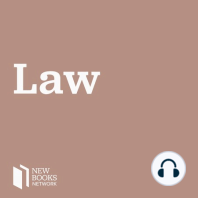65 min listen

Jinee Lokaneeta, "The Truth Machines: Policing, Violence, and Scientific Interrogations in India" (U Michigan Press, 2020)
FromNew Books in Law
Jinee Lokaneeta, "The Truth Machines: Policing, Violence, and Scientific Interrogations in India" (U Michigan Press, 2020)
FromNew Books in Law
ratings:
Length:
58 minutes
Released:
Nov 30, 2020
Format:
Podcast episode
Description
Using case studies and the results of extensive fieldwork, this book considers the nature of state power and legal violence in liberal democracies by focusing on the interaction between law, science, and policing in India. The postcolonial Indian police have often been accused of using torture in both routine and exceptional criminal cases, but they, and forensic psychologists, have claimed that lie detectors, brain scans, and narcoanalysis (the use of “truth serum,” Sodium Pentothal) represent a paradigm shift away from physical torture; most state high courts in India have upheld this rationale.
The Truth Machines: Policing, Violence, and Scientific Interrogations in India (University of Michigan Press, 2020) examines the emergence and use of these three scientific techniques to analyze two primary themes. First, the book questions whether existing theoretical frameworks for understanding state power and legal violence are adequate to explain constant innovations of the state. Second, it explores the workings of law, science, and policing in the everyday context to generate a theory of state power and legal violence, challenging the monolithic frameworks about this relationship, based on a study of both state and non-state actors.
Jinee Lokaneeta argues that the attempt to replace physical torture with truth machines in India fails because it relies on a confessional paradigm that is contiguous with torture. Her work also provides insights into a police institution that is founded and refounded in its everyday interactions between state and non-state actors. Theorizing a concept of Contingent State, this book demonstrates the disaggregated, and decentered nature of state power and legal violence, creating possible sites of critique and intervention.
Learn more about your ad choices. Visit megaphone.fm/adchoices
Support our show by becoming a premium member! https://newbooksnetwork.supportingcast.fm/law
The Truth Machines: Policing, Violence, and Scientific Interrogations in India (University of Michigan Press, 2020) examines the emergence and use of these three scientific techniques to analyze two primary themes. First, the book questions whether existing theoretical frameworks for understanding state power and legal violence are adequate to explain constant innovations of the state. Second, it explores the workings of law, science, and policing in the everyday context to generate a theory of state power and legal violence, challenging the monolithic frameworks about this relationship, based on a study of both state and non-state actors.
Jinee Lokaneeta argues that the attempt to replace physical torture with truth machines in India fails because it relies on a confessional paradigm that is contiguous with torture. Her work also provides insights into a police institution that is founded and refounded in its everyday interactions between state and non-state actors. Theorizing a concept of Contingent State, this book demonstrates the disaggregated, and decentered nature of state power and legal violence, creating possible sites of critique and intervention.
Learn more about your ad choices. Visit megaphone.fm/adchoices
Support our show by becoming a premium member! https://newbooksnetwork.supportingcast.fm/law
Released:
Nov 30, 2020
Format:
Podcast episode
Titles in the series (100)
Yuma Totani, “The Tokyo War Crimes Trials: The Pursuit of Justice in the Wake of World War II” (Harvard UP, 2008): Most everyone has heard of the Nuremberg Trials. Popular books have been written about them. Hollywood made movies about them. Some of us can even name a few of the convicted (Hermann Goering, Albert Speer, etc.). by New Books in Law